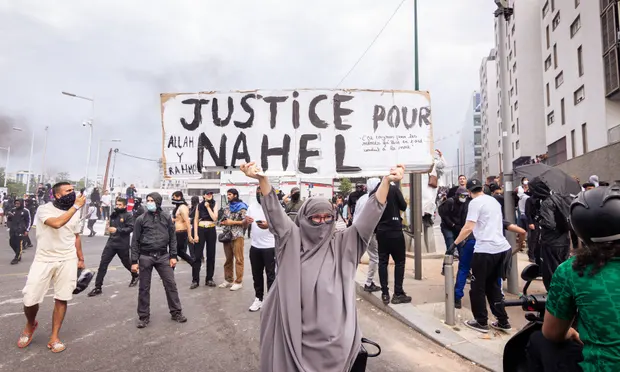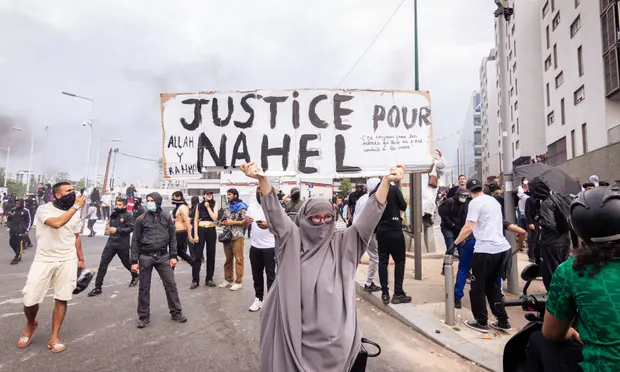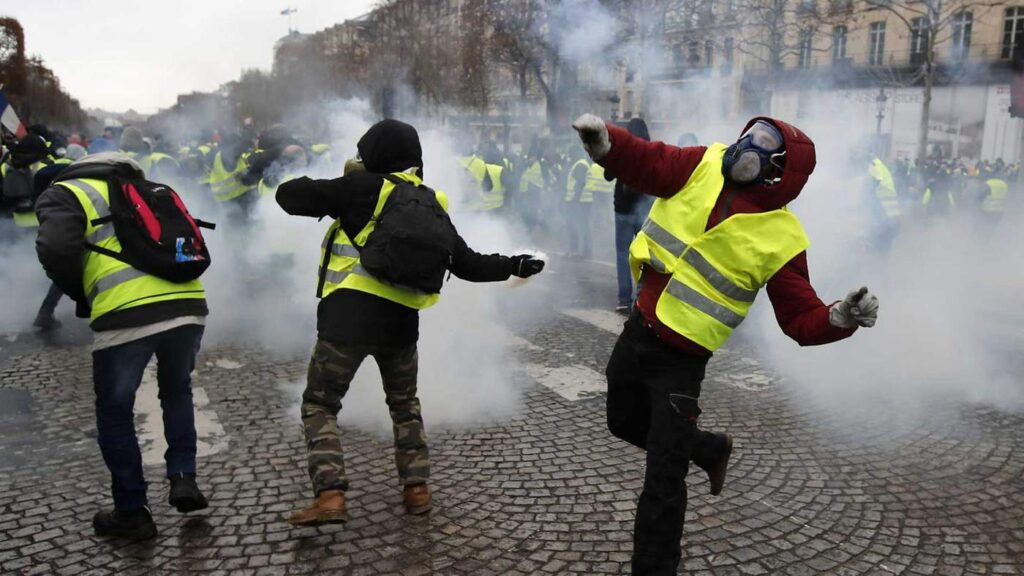Nahel’s assassination shines a light on France left behind
No race or religion, Macron’s politics, discrimination and long-term neglect at the heart of a burning France

The violence after Nahel’s murder is more about neglected suburban and rural France than race or religion.
The almost unprecedented outbreak of violence that followed the murder of a young man highlights the malaise that has gripped French society and governance, with the long-term neglect, by leaders, notably Macron, suburbs and rural areas of France.
Large parts of France, including the immediate suburbs of the capital Paris and many major cities, have been plagued by intense rioting over the past five days.
The riots that started after french font shooting a young man at point-blank range, took on an unprecedented scale, as buses, trams, buildings and shops were set on fire for four days, while the police struggled to regain control of the streets. In many ways, the current riots are even more widespread and violent than the last major riots that broke out in 2005.
And of course, with the rise of social media over the past 18 years, the riot, its reasons, and its scale have all been aired and interpreted or reinterpreted dozens of times.
The situation was so bad that the president Emmanuel Macron had to miss a meeting of the European Council, the body where the leaders of the 27 member states meet, in Brussels, while his government and his ministers struggled to react and control the situation and the damage.
On Friday, after an emergency meeting of his government, Macron announced several measures that make clear his purpose and his own interpretation of what the riots reflect.
As would happen after such an incident, a dozen interpretations have already cropped up everywhere, especially in the armchair, opinionated and almost toxic journalism that Indian media have come to define in recent years.
The spark
The origin of the riots lies in the point-blank shooting, even the cold-blooded murder, of a 17-year-old, Nahel, by the police during a traffic check in Nanterre, a working-class and poor suburb of Paris. , just a stone’s throw away. km from the hyper chic suburb of Neuilly-sur-Seine and La Défense, the business heart of France, with the headquarters of almost all the biggest French companies and multinationals.
At first the police tried to cover up, claiming that Nahel had tried to injure the officers during the stop by trying to run them over, but soon enough videos emerged showing Nahel pulling over, with two officers pointing guns at him and one shooting at him. head, moments after threatening to do so.
The appearance of the video prompted strong criticism of the police from nearly all political and social leaders, including Macron, who said the death of a young man could not be justified. The police officer who shot Nahel has been arrested and charged with murder. Nahel’s co-passengers in the car, who managed to escape, blamed the murder squarely on the police.
The son of a working mother, a single parent, Nahel worked as a takeaway delivery person and studied to become an electrician. The murder immediately sparked strong reactions in the area where Nahel lived and who was said to be popular as a friendly person.
The murder also drew strong condemnations from the French football team, including France captain Kylian Mbappé, as well as major French film star Omar Sy. The French football team then called for an end to the violence, saying it was time to mourn the death of an innocent young man and not the violence.
Focus on police atrocities
Nahel’s assassination resulted in protests initially limited to Nanterre. But hours after the truth about the shooting was revealed, protests spread across the country, including more than 1,500km south of Nanterre in the coastal city of Marseille.
The anger aroused by this murder may seem disproportionate at first sight, but it is not a random incident of this type. In the past year, police have shot at least 13 people in the same way, just because they didn’t stop when told to.
French police have become visibly trigger-happy over the past few years, particularly since a new law in 2017 relaxed the rules around when they can fire their guns. Ironically, this law was passed following the deadly terrorist attacks that rocked Paris and Brussels a little over a year earlier.
Although murders are an extreme phenomenon, police atrocities in France are widely reported and recorded. The country that hosted the United Nations Declaration of Human Rights in 1948 has been regularly singled out over the past two decades by European institutions, including the European Court of Human Rights and NGOs like Amnesty International, for its racist and discriminatory police. France regularly ranks among the countries of the European Union on this point.
Last month, at The United Nationsthe French received sermons from the United States, Russia and Iran to rein in their police whose violence had gotten out of control.
A few months earlier, in November 2022, a French government report, submitted to the Ministry of the Interior and the Ministry of Justice, highlighted the widespread practice of discrimination and violence by the French police, particularly targeting young people. Arab and African.
Discrimination beyond law and order
But Africans and Arabs should not face widespread discrimination from the police alone; they suffer the same fate in all areas of society, from education to employment and from housing to healthcare.
According to the Report on Inequalities in France 2023, the average income of the poorest living in areas like Nanterre was 844 euros per month, while that of the richest 10% in more affluent areas like Neuilly-sur-Seine is of 3,600 euros. The best schools, even public ones, remain the exclusive domain of Anglo-Saxon communities, with rare Arab or African presences.
The unemployment rate in these areas, which also include villages, often reaches 35 percent, compared to a national average of just 8 percent. The discrimination can even be seen in life expectancy since the rich have an average life expectancy of 84.4 years, while the inhabitants of “the other France” can at best hope to live up to 71 years.
No more immigrant land
Contrary to information published in the Indian media and in particular on the social networks of certain famous “journalists”, the rioters are a mixture of Arabs, Africans as well as the Anglo-Saxon French and hardly any of them are migrants from Syria or other Middle Eastern countries who fled in large numbers following the war launched by Western countries against Syria in 2011.
Admittedly, more than a million refugees landed in Europe, but most of them were welcomed by Germany, where Chancellor Angela Merkel had to pay a heavy political price for her humanitarian gesture. Barely a few hundred could have come to France. In fact, French police and border guards are regularly involved in clashes with their Italian counterparts as France pushes back migrants from Africa trying to land on European shores, after undertaking dangerous, often deadly crossings. , in the Mediterranean Sea.
Almost everyone allegedly involved in the riots was not only born in France, but also 2n/a or the third-generation migrants, whose grandparents were in fact invited and cajoled to come in the 1960s, by President Charles de Gaulle, to help rebuild post-war France.
More than 60 years later, despite dozens of reports of widespread poverty and lack of amenities like schools and hospitals, as well as high unemployment, successive governments have done little. .
The gap between haves and have-nots has widened further under President Macron, who since 2017 has been implementing policies clearly favoring the top 5% of the French population, often at the expense of the poorest.
Protests that have been going on for months Yellow vest (yellow vests) a few years ago was another reflection of the growing anger and widespread dissatisfaction among French people who feel left behind by Macron, who they say is only pleasing his investment banker friends .
After his speech at the end of the emergency government meeting on Friday, it would have been nice to hear Macron announce measures to close this gap and acknowledge the wounds that are gnawing at him. Instead, he chose to turn a blind eye once more to the root cause of the riots and focus on his usual heavy-handed tactics.
Until the French state recognizes the existence of the “Other France” and takes real action to reverse growing inequalities in a country whose motto is Liberty, Equality, Fraternity, violence is set to return from from time to time and at each recurrence. harder than ever.




